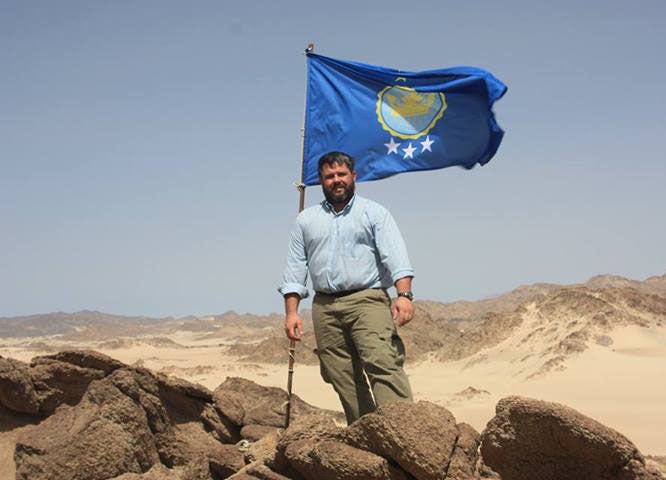American dad stakes claim to African kingdom of 'North Sudan’ so his daughter can become a princess
Mr Heaton has said that he plans to “reach out” to the African Union for assistance in formally establishing the 'Kingdom of North Sudan'

Your support helps us to tell the story
From reproductive rights to climate change to Big Tech, The Independent is on the ground when the story is developing. Whether it's investigating the financials of Elon Musk's pro-Trump PAC or producing our latest documentary, 'The A Word', which shines a light on the American women fighting for reproductive rights, we know how important it is to parse out the facts from the messaging.
At such a critical moment in US history, we need reporters on the ground. Your donation allows us to keep sending journalists to speak to both sides of the story.
The Independent is trusted by Americans across the entire political spectrum. And unlike many other quality news outlets, we choose not to lock Americans out of our reporting and analysis with paywalls. We believe quality journalism should be available to everyone, paid for by those who can afford it.
Your support makes all the difference.Jeremiah Heaton was playing with his daughter in their Abingdon, Va., home last winter when she asked whether she could be a real princess.
Mr Heaton, a father of three who works in the mining industry, didn’t want to make any false promises to Emily, then six years old, who was “big on being a princess”. But he still said yes.
“As a parent you sometimes go down paths you never thought you would,” he said.
Within months, Mr Heaton had travelled to an unclaimed 800-square-mile patch of arid desert between Egypt and Sudan. There, on 16 June — Emily’s seventh birthday — he planted a blue flag with four stars and a crown on a rocky hill.
The area, named Bir Tawil by locals, has now been called the “Kingdom of North Sudan” by Mr Heaton and his family.
“I wanted to show my kids I will literally go to the ends of the earth to make their wishes and dreams come true,” Mr Heaton said.
Sheila Carapico, professor of political science and international studies at the University of Richmond, told the Bristol Herald Courier last week that Heaton would need legal recognition from neighboring countries, the United Nations or other groups to have actual political control of the land.
Mr Heaton, who unsuccessfully ran for Congress out of Virginia’s 9th district in 2012, said that he plans to “reach out” to the African Union for assistance in formally establishing the Kingdom of North Sudan, and that he is confident they will welcome him.
Representatives from the Egyptian and Sudanese embassies in Washington did not respond to requests for comment on Saturday.
Mr Heaton planted his flag in what he is calling the Kingdom of Northern Sudan, an area of unclaimed desert between the borders of Egypt and Sudan, on 16 June. Mr Heaton has claimed authority over the land as its king, and said that his claim is legitimate.
He argues that planting the flag — which his children designed — is exactly how several other countries, including what became the United States, were historically claimed. The key difference, Mr Heaton said, is that those historical cases of imperialism were acts of war, while his was an act of love.
“I founded the nation in love for my daughter,” Mr Heaton said.
After he promised his daughter that she could be a princess, Heaton began searching online for unclaimed land. When focusing his search on the Latin term “terra nullius”, meaning “land belonging to no one”, Mr Heaton found information on Bir Tawil.
He said that a border dispute between Sudan and Egypt left the land as unclaimed territory, about halfway between where the Nile crosses into Sudan and Egypt’s coast along the Red Sea.
This research led Mr Heaton to seek permission from Egyptian authorities to travel to the remote, unpopulated plot of sand, explaining his cause. At first, even he was skeptical of his own plan.
“I was fearful of going into a toxic environment,” Heaton said.
Once he got permission, the former emergency services director for a local county headed to Egypt and spent a few days there before arriving at Bir Tawil. His perspective of the region quickly changed as he traveled.
“I cannot stress how kind and generous the Egyptian people are,” Heaton said.
The next step in Heaton’s plan is to establish positive relationships with Sudan and Egypt by way of converting his “kingdom” into an agricultural production center as his children, especially Emily, wanted.
©Washington Post
Join our commenting forum
Join thought-provoking conversations, follow other Independent readers and see their replies
Comments